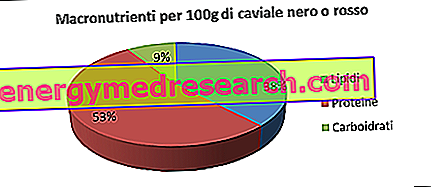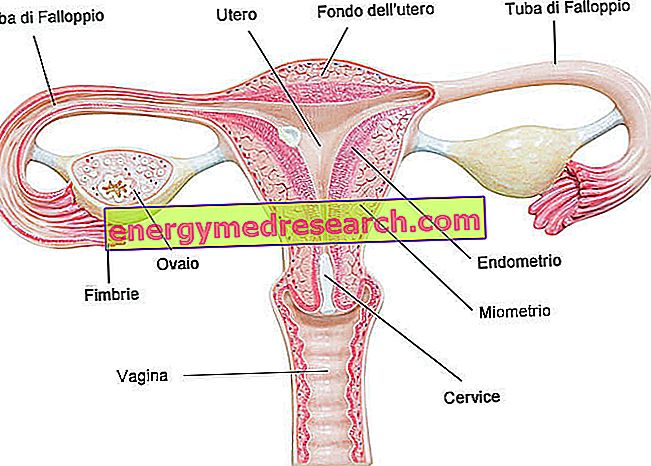Obviously, fish eggs are NOT all the same and their nutritional characteristics depend mainly on the fish species and the type of processing (if any) they have undergone (eg salting, smoking etc.).
Before looking in more detail at some nutritional values of fish eggs (not all, as there are few data available as it is quantitatively MARGINALI food if contextualised in the collective feeding), we remember that it is, like bird eggs, female gametes intended for reproduction; this means that ALL the category of fish eggs brings significant amounts of lipids, also essential but not without cholesterol and phospholipids, of vitamins (both fat-soluble and water-soluble), mineral salts and high biological value proteins. The respective energy density is fairly high on average.
Caviar nutritional composition

| Power | 252, 0kcal | |
| Protein | 24, 6g | |
| Lipids TOT | 17, 9g | |
| Saturated | 4, 1g | |
| Monounsaturated | 4, 6g | |
| polyunsaturated | 7, 4g | |
| Cholesterol | 588, 0mg | |
| Carbohydrates | 4.0g | |
| Sodium | 1500, 0mg | |
| Football | 275, 0mg | |
| Iron | 11, 9mg | |
| Thiamine | 0.2mg | |
| Riboflavin | 0.6mg | |
| Niacin | 0.1mg | |
| Vitamin D | 232, 0UI | |
| Equivalent retinol | 271, 0RAE | |
| Vitamin E | 1, 89mg | |
Nutritional composition of mullet and raw tuna eggs - medium

| Power | 143, 0kcal | |
| Protein | 22, 3g | |
| Lipids TOT | 6, 4g | |
| Saturated | 1.5g | |
| Monounsaturated | 1, 7g | |
| polyunsaturated | 2, 7g | |
| Cholesterol | 374, 0mg | |
| Carbohydrates | 1.5g | |
| Sodium | 91, 0mg | |
| Football | 22, 0mg | |
| Iron | 0.6mg | |
| Thiamine | 0.2mg | |
| Riboflavin | 0, 7mg | |
| Niacin | 1, 8mg | |
| Vitamin D | 0, 0UI | |
| Equivalent retinol | 90, 0RAE | |
| Vitamin E | 7, 0mg | |
Nutritional composition of mullet and tuna mullet - medium

| Power | 373, 0kcal | |
| Protein | 35, 5g | |
| Lipids TOT | 25, 7g | |
| Saturated | - | |
| Monounsaturated | - | |
| polyunsaturated | - | |
| Cholesterol | 440, 0mg | |
| Carbohydrates | 0.0g | |
| Sodium | - | |
| Football | - | |
| Iron | - | |
| Thiamine | - | |
| Riboflavin | - | |
| Niacin | - | |
| Vitamin D | - | |
| Equivalent retinol | - | |
| Vitamin E | - | |
Conclusions
Unfortunately, in the absence of reliable sources that translate the nutritional content of the other fish eggs mentioned above (carp, cod, flying fish, lumpfish etc.), we must be satisfied with the 3 tables above. However, if it can comfort readers, the composition of the other fish eggs should not deviate much from those of sturgeon, tuna and mullet-mullet; this means that the fish eggs:
- They are fairly caloric
- They have a medium to high fat content
- They have a high content of polyunsaturated fatty acids and are probably essential omega-3s
- They have a high cholesterol content
- They have a high content of high biological value proteins (VB)
- They bring significant amounts of B vitamins, especially thiamine, riboflavin and niacin
- They bring significant amounts of fat-soluble vitamins, especially retinol equivalents, vit. D and vit. IS
- They contain a good supply of bio-available iron
- They are NOT useful sources of carbohydrates
NB . The food portions of fish eggs are particularly reduced, therefore, it is necessary that readers interpret the values taking into consideration that, after all, they do not constitute a significant “slice” of the daily dietary intake.



